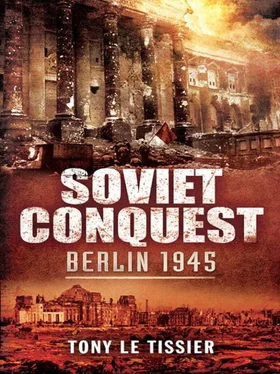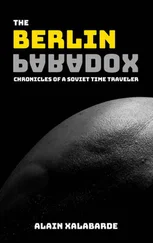Everywhere the enemy was conducting a bitter resistance. As our air reconnaissance established, he was bringing his second echelon into the battle. Apart from this, two motorised divisions were approaching the Seelow Heights on our main line of attack, and two further divisions were on the march from the Schwedt area.
‘It’s hardly believable. The enemy is sending reserves into action during the fight for the second line of defence,’ commented Shalin on the situation. ‘There, look.’ He passed me a leaflet. It was an appeal by the commander of an SS tank corps to his soldiers. It said that the ‘beloved Führer’ had declared on the 12th April that Germany now had, as never before, a real chance to stop the advance of the Red Army, that Germany had vast amounts of artillery and tanks at its disposal. All requirements had been met for the coming battle of Titans on the Oder that would bring about a change in the war.
A call over the radio telephone line interrupted our talk. I recognised the well-known voice of the Front commander. He gave the surprising order that before the enemy resistance had been completely broken, the 1st Guards Tank Army was to enter the battle and complete the breakthrough of the tactical defence zone with the 8th Guards Army.
I was not enchanted with the idea of setting our vehicles against the still unsuppressed nests of fire, although I saw that the marshal could not decide otherwise under the circumstances. After nine hours of ceaseless attacks Chuikov had only been able to penetrate a few sections of the second line of defence. The whole of the Front’s attack operation was threatening to collapse. Apart from this it would be to our advantage if the enemy brought his reserves from Berlin up into the open ground where one could defeat them more easily on the Seelow Heights than in the city’s streets.
I immediately ordered all three corps to deploy in the bridgehead. I sent the 11th Tank Corps under General Yushtchuk to the right wing, in the centre [was] the 11th Guards Tank Corps under Colonel Babadshanian, and on the left wing General Dremov’s 8th Mechanised Guards Corps. However, the manoeuvrability of the tanks was so limited by the narrowness of the bridgehead, the numerous ditches and minefields, that it was not possible to get the army’s main forces into action simultaneously.
From my observation post I could see Babadshanian’s tanks manoeuvring between shell holes and ditches before they could attack. As they could not overcome the steep slopes of the Seelow Heights, they had to seek the narrow ways through under especially heavy fire.
The remainder of the day brought no happy news. With great difficulty and heavy losses the tank troops had bitten into the defences, but were unable to push forward from positions occupied by the infantry. The rifle divisions operating closely with the tank corps also had a hard time of it.
I was working with my staff in a narrow rifle trench. The saturated ground splashed under my feet. Apart from Shalin, I met Sobolev, the chief scout.
‘How’s it going for the enemy?’ I asked.
‘They are defending themselves like the devil. One division is holding on the average a 5 kilometre wide sector. Thus a battalion has only 800 metres of front.’
‘That’s quite a lot. Formerly the Fascists usually defended sectors of 15 kilometres. And how many reserves have you established?’
‘Until now eight divisions, of which five are motorised and one armoured. Apart from that there are about 200 Volkssturm battalions in Berlin, many anti-aircraft gun elements and various special units.’
With good cover they were actually in a position to conduct a serious defence. But how could we avoid unnecessary losses? This question occupied the whole of my time.
Shalin unfolded an aerial photograph and a large-scale map. It seemed to me that the ground north of Seelow was more suitable for tanks and that the defence there was less than that on the Heights.
‘Certainly,’ agreed Shalin. ‘To attack a sector like the present one makes less sense.’
‘One must give the units on the right flank more artillery and air support, and break through in that direction. If that works we can commit the whole army.’
It was only at the end of the 17th April that Babadshanian reported that his brigades had completed the breakthrough of the second line of defence with the cooperation of the infantry, and had pushed on. Over the radio I ordered Dremov to leave behind a brigade as security, but to send his main forces through the breach created by Babadshanian and to support him in the development of the success. I also sent Boiko’s 64th Guards Tank Brigade into the same breach with two self-propelled artillery regiments and other units.
But the enemy deployed fresh forces into the threatened area from the left flank. Babadshanian fell into a difficult situation, as he now had to repel counterattacks on his left flank on top of meeting frontal assaults. I reinforced Boiko’s brigade with artillery as well as a mortar unit, and charged him with repelling the attacks on his left wing with infantry and tanks. I was certain that this energetic and resourceful commander would fulfil his task. In fact he reliably secured Babadshanian’s flanks and caused the enemy attack to fail.
The 11th Guards Tank Corps commanded by General Yushtchuk was able to advance somewhat faster, its units being able to penetrate 10 kilometres into this area against a considerably weaker defence. In the same area General Berzarin’s 5th Shock Army was able to advance about 10 kilometres further north.
On the 18th April the fighting for the Seelow Heights reached its crisis. The enemy kept throwing in new divisions, Volkssturm units and tank-hunting commandos of the Hitler Youth. Anti-aircraft gun batteries on the tanks’ line of advance caused considerable difficulties. With the enemy literally climbing out of his deep trenches, having silenced his concrete firing positions as well as fixed tank turrets and dug-in tanks, our tank troops advanced at the most only 4 kilometres per day on the 17th and 18th April.
I had General Krupski, commander of the air corps, in my command post constantly with me. As soon as a commander reported that in this or that map square he had come across a strong defensive position, I immediately informed the general. He then had his pilots fly to the hotly disputed point. These air strikes were effective. That our troops were able to break through the defences on the Seelow Heights in one or two days was without doubt Krupski’s airmen’s greatest service. Together with the ground troops, they smashed breaches in the mighty defensive system.
Meanwhile the units of the 1st Guards Tank Army pushed forward unstoppably in close cooperation with General Chuikov. Babadshanian’s corps going around Seelow from the north helped the infantry to clear the enemy out of the town on the evening of the 17th April. Our headquarters then deployed to the edge of the town. The main and side streets were blocked with vehicles, tanks and self-propelled artillery. The enemy artillery still shelled the town and there were air battles, but Seelow was in our hands. As Babadshanian reported, there was some hard fighting at Müncheberg, halfway between Seelow and Berlin. The SS people fought despairingly, the town changing hands three times. Members of the motorcycle battalion commanded by Lieutenant Baikov captured thirty-eight intact aircraft on the airfield near Müncheberg.
During the course of the first four days of the attack the 1st and 2nd Guards Tank Armies were engaged primarily in the immediate support of the infantry. Today, now that all the details of the fighting for the Seelow Heights are known, one knows that the Front command made a series of errors, particularly in the underestimation of the strength of the Seelow Heights’ two defensive strips. During the course of our attack we detected that the enemy had put his main effort into the defence of the Seelow Heights. Because of this the Fascist high command had withdrawn a large part of its forces and resources from the forward strips in this area. Consequently, the Front’s troops, instead of thrusting forward, had to work their way slowly through the defensive positions.
Читать дальше












